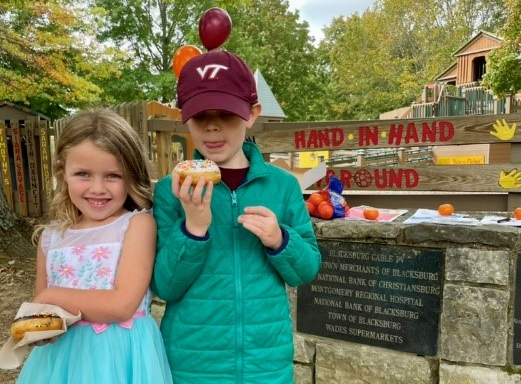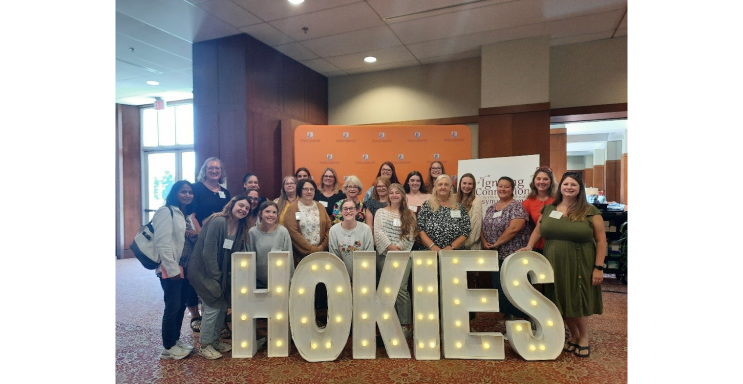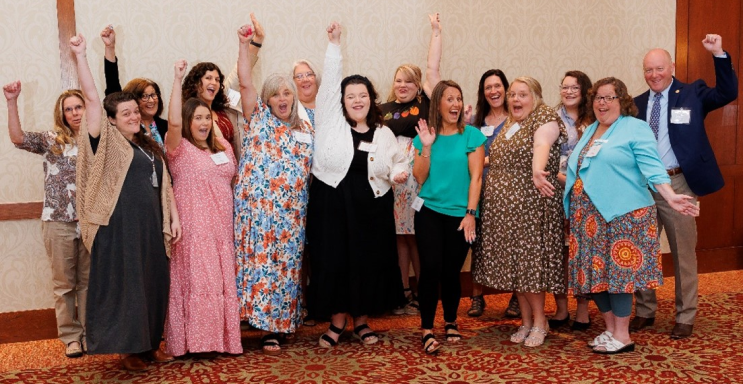“We’re happy to be supporting the community first. There’s nothing to say that this will be our only strategy forever, but we have felt really good about this collaboration with our community.”
– Kim Thomason, Program Manager for Virginia Tech, Early Childhood Education Initiatives
Background: Surveys Show Local Child Care Options Not Meeting Needs
Located in rural Virginia in the New River Valley, Virginia Tech is a university with multiple campuses that support 38,000 students and 13,000 full- and part-time staff. Virginia Tech’s 2020 strategic plan outlined the university’s goal to “Be a destination for talent.” As the university has increased its faculty and staff, the need for child care has grown as a top priority.
In 2021, Virginia Tech formed the Early Childhood Education Initiatives, or ECEI, a child care focused executive working group formed after data from New River Valley community surveys unearthed myriad community needs related to child care and early childhood education (ECE). The ECEI connects staff, local experts and community members to bolster caregiving resources for the wider Virginia Tech community. Using surveys and other evaluation tools, the ECEI regularly assesses and responds to community needs for child care and advocates for new funding to support local caregiving initiatives and ECE programming.
At the time of their latest survey in 2023, 76% of employee and student respondents needed or used some form of child care, and 47% reported that their current child care arrangements did not meet their needs in terms of reliability, flexibility or availability.
Solution: A Multipronged Approach to Build Up Community Child Care Resources
Through the ECEI, Virginia Tech’s work in child care and early childhood education (ECE) focuses on three goals:
1. Increasing employee and student access to high quality early education
2. Supporting employees and students as parents and caregivers
3. Working within communities to support early education as a larger community issue and increase access for all
Virginia Tech uses varied strategies to meet these goals. Through outreach efforts, programming and partnerships with the local child care industry, Virginia Tech’s child care model makes community and child care providers’ needs a priority, says Kim Thomason, program manager for Virginia Tech’s Early Childhood Education Initiatives working group. Here’s how they work.
Child Care Center Partnerships Secure Enrollment for Staff and Students
Virginia Tech enters into agreements with multiple early care and education programs to provide enrollment opportunities directly to Virginia Tech families. For faculty, staff and students that live locally around Blacksburg, Pearisburg or Roanoke, there are five local partnerships that ensure a set percentage of new enrollment opportunities are available for Virginia Tech families. Depending on the partner, between 20% and 65% of new enrollment opportunities are reserved for Virginia Tech. This strategy differs from many child care partnership agreements where businesses often purchase spots for their workforce. Instead, the school purchases a percentage of the available enrollment, guaranteeing that Virginia Tech families receive priority child care access when spots are available. These contracts support the families who need child care, of course, but also the child care providers’ businesses.
“We want our child care partners to feel like this is a collaborative effort,” said Thomason. “We have specific goals to support our students, faculty and staff, but we want to be a community partner. Ideally, these contracts help the community at large because it offers the centers another form of income. Our hope is that this type of collaboration helps them stabilize and provide the maximum access their program allows.”
Backup Care and Au Pair Networks Offer Flexibility
Recently, Virginia Tech added two partnerships offering additional care methods: backup child care support and discounts on au pair fees. For backup care, Virginia Tech employees receive unlimited premium access to the Care.com network of backup care options. When hiring an au pair for child care, employees can also receive a $500 discount through Cultural Care Au Pair, which they can access directly through the partner’s website.
“We’re thinking about flexibility and parent choice,” Thomason said about these options. “We have employees who are teaching night classes or are here from early morning and leave at 2 p.m. Most child care centers operate on traditional hours, and we need to be able to provide employees and students the flexibility they need.”
Strengthening ECE Career Pipelines Through Community Partnerships
Virginia Tech also works closely with the New River Valley Community Foundation and the New River Community College to support workforce development. Annually, these partners bring together high school students from five localities for a full day of learning and networking with early care and education professionals. The focus is to recruit and develop early childhood career pathways from high school or community college through graduate-level degrees. The university also facilitates an annual day of professional development for any early childhood educators or administrators in the New River Valley to network and learn together. “It helps,” Thomason states, “because in our rural area, often the educators can’t pay for or take the time to travel to a state or national conference. So, we bring the topics and learning to them.”
‘Caregiving Hub’ Provides Robust Resources
The final solution Virginia Tech has implemented to support caregivers is their caregiving hub: a website that offers details on signing up for child care through one of their partnerships, backup care options, parent support groups, caregiving policies and even hand-me-down exchange events. “It’s one of our biggest successes,” Thomason shared. This site offers quick and accessible information for anybody who needs information on child care solutions.
Results: Focus on Child Care Resources Helps Improve Satisfaction and Campus-Wide Collaboration
Through this robust menu of child care solutions for the Virginia Tech community, ECEI leaders have reported improvements in employee satisfaction, including positive feedback on the increase in depth and breadth of resources available. Anecdotally, they’ve also seen increased collaboration and communication across the groups on campus that work to support parenting employees and students. Most telling, though, is the increase in child care enrollment by Virginia Tech employees and students.
Challenges with Limited Care Options and Formal Processes
Of course, they have seen bumps along the way, as well. As a university located within the largely rural Appalachian region of Virginia, the communities outside of Blacksburg tend to be conservative. They value self-reliance, connections to neighbors and family and Appalachian traditions. In this area where resources are more limited, the community often uses family, friend and neighbor care, often referred to as FFN, to meet child care needs. While providing a menu of options to support parental choice in child care is foundational, Thomason said that in an area that has limited variety in types of licensed early care and education, it is difficult to ensure.
For the partnerships with local child care centers, Virginia Tech relies on a robust request for proposals (RFP) process through their procurement office, which can be an intimidating process for prospective partners. “[Finding new partners] entails access to and understanding of the RFP process and goals,” said Thomason. “Many local programs have never had to apply or put in a proposal, so we learned that we have to help them know what it looks like and give them an opportunity to ask questions.”
Thomason’s Advice to Fellow Leaders
Thomason has this advice for business leaders hoping to form community child care partnerships:
– First, clearly define the roles and goals for your organization around early care and education.
– Build strong relationships within the local early care and education community, including by building in regular and transparent communication with all partners.
– Once partnerships are in place, create ways for each partner to be able to assess the partnership and provide feedback; it’s critical for maintaining alignment between the two entities.
– Finally, base any changes and new strategies on data; create structure that allows you to reflect back on progress and make incremental adjustments to current and future needs.


